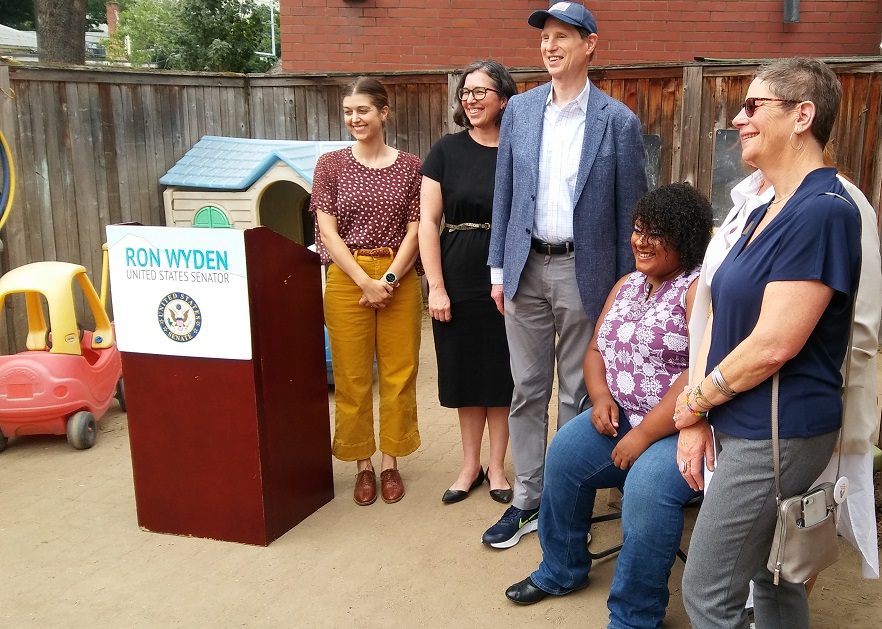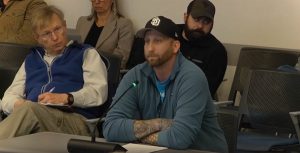Sen. Wyden hears from Eugene moms: Child care is ‘the work that makes all other work possible’
6 min read
Kerry Willhite, Andrea Paluso, Sen. Ron Wyden, Maisie Davis, Amber Childress, and Lane County Commissioner Laurie Trieger gather for a group photo at Oak Street Child Development Center on June 30, 2021.
Sen. Ron Wyden visited the Oak Street Child Development Center on Wednesday. He is visiting all 36 counties in Oregon to talk about the importance of our child care infrastructure.
Sen. Ron Wyden: [00:00:13] I feel really strongly, that to have high skill, high wage jobs for Oregon and our country, we have to invest in roads and bridges and people… If you’re going to move goods from Point A to Point B, you’ve got to have workers who have access to child care. It’s just that simple: The relationship between those physical investments and investing in people go hand in hand.
John Q: [00:00:54] Andrea Paluso, Executive Director of Family Forward Oregon, said child care is “the work that makes all other work possible.”
Andrea Paluso: [00:01:03] Without it parents can’t work and mostly mothers, because it is mostly mothers who will suffer the economic burdens of not having child care, not being able to remain in the workforce.
Child care is a sector that is critical. It’s essential work. So another way that we need to build back better, it’s to pay people that are concentrated in the care workforce better.
John Q: [00:01:25] Kerry Willhite is a full-time working mom, who also serves on the Oak Street board.
Thank you for supporting
local citizen journalism
Kerry Willhite: [00:01:31] Tuition is our biggest expense every month. We make financial sacrifices elsewhere so that our child can attend the program that works best for us. We’re fortunate that we can make that choice. Many families are not so fortunate. The recession and the pandemic have made it very clear to me that having a system of care that is reliant on a family’s ability to pay makes us all vulnerable.
We need to invest in child care, just like we invest in all other infrastructure. We need support from Congress to build the system our children and our essential providers deserve.
John Q: [00:02:05] Maisie Davis said even before COVID, even with a Master’s degree in Social Work, she could not find a job that covers childcare costs.
Maisie Davis: [00:02:15] Like most parents in our community, I cannot find a child care option that works for my unique family. I’m a single mom with an eight year old son. And before COVID the cost of most child care options was totally unattainable on a single income. A crisis like COVID made my life impossible.
John Q: [00:02:40] Before COVID, her son’s after-school care was $40 per year. During COVID, full-time care shot up to $600 per month.
Maisie Davis: [00:02:50] So then I have to choose child care or rent. You cannot imagine the stress this puts on you until you live it firsthand. It has been a very, very hard year for the both of us. We have not had any breaks from each other for 15 months and counting. I, as a single mom cannot be everything for my son. I can’t be a full-time mom, a full-time worker and a full-time educator. Our child care system must be better. Parents, especially single parents, can not keep on like this.
John Q: [00:03:37] Amber Childress is an entrepreneur and small business owner.
Amber Childress: [00:03:41] Like other working moms, I can’t go back to work until child care facilities are open full-time and are affordable. I want to achieve my dreams and make an impact in our community, but I can’t grow my business without child care.
John Q: [00:03:58] Moms suspended their careers during COVID. Their kids at home needed help with distance learning. Those child care services allowed dads to stay on the job. Amber Childress.
Amber Childress: [00:04:10] Real sustainable recovery from COVID-19 is only going to come when we start to realize what it takes to raise a family. When we have to worry about affording care for kids, or whether or not you can even go to work, you can’t focus on your business, which means working moms do not get to thrive. Paid leave, child care and universal basic income are not nice-to-haves. They are critical for the economy, and imperative for a resilient and equitable recovery.
John Q: [00:04:39] Andrea Paluso, Executive Director of Family Forward Oregon.
Andrea Paluso: [00:04:44] Things are stark across the country, and here in Oregon, as you’ve heard today. We work with mothers every day who are telling us about the impossible positions they are in because they don’t have access to child care. This crisis is taking a financial toll, but also a physical and mental health toll on mothers every year. Since last March, millions of women had to leave the workforce. Black, LatinX, and Pacific Islander women have been hardest hit by job losses and by our lack of access to quality affordable child care and family leave, which are compounding the already disparate health impacts that these communities have faced from the virus itself.
Early research is also showing huge spikes in physical health decline and increased mental health concerns for mothers. Over half of the mothers said in a recent study that their mental health has significantly worsened because caregiving has always and continues to fall disproportionately on the shoulders of women. The lack of affordable, accessible child care and paid family leave forces women out of their jobs at a much higher rate than it does men.
…A child care system that works for every family would mean economic security for Oregon women and families, for child care providers and for our state as a whole. Investments in child care and paid leave grow our economy while also addressing the ongoing inequities that women and families of color face. There is no better way to jumpstart our economic recovery than by investing in mothers and in care.
John Q: [00:06:17] Sen. Wyden said, as chairman of the Senate Finance Committee, he is happy to help.
Sen. Ron Wyden: [00:06:23] Now, fortunately, we’ve been able by dint of the Senate Rules, to steer a whole lot more of the “Investment In People” agenda, like child care, to the Senate Finance Committee. Senate Finance Committee has never really done a lot of that in the past, by the way.
And on the Senate Finance Committee, you got lot of friends. Senator Warren just joined the committee. She called me this morning to talk to me about child care.
I’m going into the Senate Finance Committee, I’m going to bang the gavel and I’m going to say, you don’t get this addressed if you don’t get child care right. And that’s investment in families, and increasing the supply of child care facilities, and making sure that families of modest means get a little bit of help so they can afford child care.
John Q: [00:07:17] Sen. Wyden said his committee will also play a role in addressing mental health.
Sen. Ron Wyden: [00:07:23] What I said at the Finance Committee was: On my watch, we believe that mental health care should be there when you need it.
And there are a number of pieces to the puzzle. For example, how many of you knew that there’s supposed to be parity in federal law, between physical and mental health care? How many of you knew that? Supposed to be. Think it actually happens? Not based on my investigation. The Department of Psychiatry at the University of Oregon Health Sciences Center said that all these insurance companies were stalling on paying the bills for mental health. So I opened up an investigation as chairman of the Finance Committee. I called up the psychiatry department two weeks later and said, How’s it going? They said, Ron, it’s going great. All the bills got paid immediately after you opened up an investigation, it was in the newspaper. All the bills, suddenly the money’s pouring in. That’s not a mental health policy.
So here’s what we’re going to do. We’re going to hold the insurance companies accountable. Okay. We are going to deal with the enormous racial disparities in terms of access to services, going to put a special focus on vulnerable populations, kids, parents trying to juggle all these things and seniors, and we’re going to stay at it until in America you can get mental health care when you need it.






